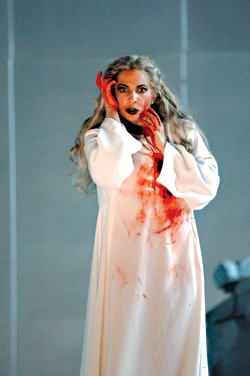The most intriguing aspect, among many, of Seattle Opera’s new production of Verdi’s Macbeth was trying to figure out just what soprano Andrea Gruber was up to as Lady Macbeth. In a role that Verdi famously suggested need not be sung with conventional prettiness, she seemed to be fearlessly, but inconsistently, experimenting with various vocal characterizations. Sorting out intentional theatrical effect from genuine vocal unease kept me riveted as much as anything else onstage.
In her entrance aria—as her ambitions awaken and she realizes Macbeth is just one murder away from becoming king—there was a severely pinched quality to Gruber’s voice, an audible sneer. As both a timbral expression of evil and an example of an artist daring to put dramatic truth before surface attractiveness, it was thrilling. In the following duet with Macbeth, her voice opened up and smoothed out, and it seemed she was going even further with her characterization, making an audible difference between the villainy Lady Macbeth expresses in private and the mask she wears in public.
Her second soliloquy, however, was sung with (what I had thought was) her “public” voice, clear and ringing, though her sentiments were no less ruthless. Comes the banquet scene, in which Lady Macbeth, now queen of Scotland, leads the company in a drinking song. Just when, dramatically, her voice should be at its suavest and most triumphant, the pinched quality returned . . . uh-oh. Was this vocal color change not intentional? One particular thing the drinking song and the entrance aria had in common was floridity, and now it seemed that what made Gruber’s voice tighten up was the approach of coloratura—which, yes, she handled as though she were driving a car very fast downhill on a gravel road: not quite out of control, but not at all comfortable.
Macbeth sees Banquo’s ghost and starts having a fit, and Lady Macbeth tries to cover for him. What Gruber brought to this passage was extraordinary: a nervous, breathless flutter, almost gasping, as she worries that Macbeth’s public meltdown might ruin everything they’ve achieved. I braced for fireworks in her final aria, the sleepwalking scene (“Out, out, damned spot,” etc.), but it was— Gruber’s final surprise in an evening full of them—poised and assured, even a bit tame.
Vocally, that is. Visually, it was stunning, which brings me to Robert Israel’s production. His costumes are updated to the time the opera was written, the 1840s (not the freshest idea, but it worked), with men in handsome tartan-trimmed dress uniforms and women in hoopskirts. Half the witches are in bridal white, the other half in widows’ black, many in scarlet gloves. Israel’s set is a looming gray tiled box—not coincidentally, I’m sure, calling to mind an asylum cell—a blank canvas for Christopher Akerlind’s marvelous lighting effects, which range from unearthly fuchsia during the witches’ prophecies to Scottish fog to, in that sleepwalking scene, a flood of bleak grayish white. Here, Israel also calls for lots of red accents. By the bucketful.
Gordon Hawkins’ Macbeth is a deft balancing act, conveying him as both a bold warrior and a puppet of his psycho wife. His baritone has a sort of deep surface richness to it; think of thick-piled velvet. Joseph Calleja, a tenor on the way up, was shrewdly cast as Macduff. He sings only a line here and there solo until his brief but emotionally climactic aria well into Act 3. His vocal beauty— a warm tone with a tight, almost old- fashioned vibrato, idiosyncratic and extremely attractive—thus came as an eleventh-hour surprise, enhancing its wow factor. I imagine Speight Jenkins is being flooded with inquiries about when he’s coming back.







